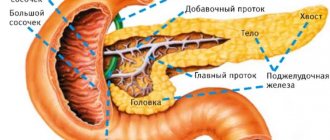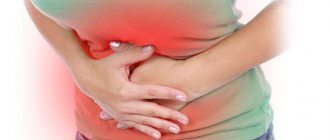What to do if your pancreas hurts during pregnancy? Any health problems can overshadow one of the happiest periods in a woman’s life. Disturbances and pathologies in the functioning of internal organs affect not only the mood and well-being of the expectant mother, but often also the condition of the baby. When the pancreas fails, you need to immediately contact a specialist to avoid a threat to the life of the fetus. However, you must understand that pancreatitis or other diseases of the digestive system have a number of possible causes. We will tell you what the symptoms of inflammation of the pancreas are. What factors lead to it? How to prevent digestive problems during pregnancy and prevent acute pancreatitis for those who are chronically ill with this disease. What is the treatment, etc.
Inflammation of the pancreas during pregnancy
Treatment of pancreatitis during pregnancy
When developing obstetric tactics, the peculiarities of the course of the disease in a particular patient are taken into account.
Women with stable remission, preserved secretion in the absence of complications (pancreatogenic diabetes, etc.) are recommended to undergo dynamic observation, periodic examinations by a gastroenterologist, and diet correction with limited amounts of spicy, fatty, fried foods, and complete abstinence from alcohol. When prescribing medications for the treatment of concomitant disorders, it is necessary to take into account their possible pancreatotoxic effect. Acute pancreatitis that develops before the 12th week of pregnancy is an indication for its termination, and for a gestational age of 36 weeks and beyond - for early delivery. A patient with active pancreatitis is hospitalized in a surgical hospital. The main therapeutic objectives are relief of pain, inflammation, restoration of the secretory functions of the organ, removal of intoxication, and prevention of possible complications. An important stage of treatment is to ensure functional rest of the damaged gland: to suppress the secretion of pancreatic juice for 3-7 days (taking into account the severity of inflammation), a regime of hunger and thirst is observed with parenteral nutritional support, the contents of the stomach are aspirated every 4-6 hours through a nasogastric tube, local hypothermia of the epigastric region. The drug therapy regimen includes:
- Gastric secretion blockers
. The drugs consolidate the effect of the created functional rest of the pancreas. A decrease in the volume of secreted gastric juice is accompanied by a decrease in the activity of pancreatic secretion, which makes it possible to localize damage and prevent further autolysis of the organ. - Anti-enzyme agents
. Antiproteolytic drugs allow you to inactivate pancreatic enzymes that destroy gland tissue. More effective when the process is active. For chronic variants of the disease, drugs with a metabolic effect that selectively inhibit trypsin are preferred. - Analgesics
. To eliminate pain, non-steroidal anti-inflammatory drugs and antispasmodics are prescribed. In more complex cases, glucocorticosteroids are used. In case of intense pain and signs of pancreatogenic shock, epidural anesthesia with mepivacaine and buprenorphine is possible. - Detoxification drugs
. Since active pancreatitis is accompanied by massive tissue destruction, pregnant women may develop severe intoxication syndrome. To remove toxic metabolites, infusion therapy with drip administration of crystalloid and colloid solutions is used.
To prevent infection of foci of necrosis, it is possible to prescribe antibiotics that have no contraindications for use during pregnancy. In severe cases of pancreatitis, according to indications, the volume of circulating blood is replenished, under the control of diuresis, disorders of water and electrolyte metabolism are corrected, and antiplatelet agents are used. After stopping the active process in the presence of functional organ failure, replacement therapy with multienzyme drugs is carried out.
To prevent infectious complications, the patient is recommended to have a natural birth with adequate pain relief (usually epidural anesthesia). Due to the significant risk of infection, cesarean section is performed in exceptional cases for obstetric indications. If conservative therapy is ineffective, the destruction of the gland increases, the inflammatory process spreads to the retroperitoneal tissue and peritoneum, sanitizing and drainage interventions and pancreaticoduodenal resection are indicated. Usually, in the 3rd trimester before abdominal surgery, pregnancy is completed with surgical delivery, which allows saving the life of the child.
Forms of pancreatitis in pregnant women
Special attention should be paid to the form of pancreatitis. If the disease is acute, the risks associated with pancreatitis are much higher
As a rule, acute inflammation of the pancreas is incompatible with the first weeks of pregnancy. As for chronic pancreatitis, the prognosis is more favorable, since pancreatitis does not have a significant negative effect on the baby.
Acute pancreatitis during pregnancy
Acute inflammation of the pancreas is a rare occurrence in the gestational period. But at the same time, this condition is extremely dangerous and can significantly complicate the course of pregnancy.
The acute form of the disease consists of disruption of the patency of the organ duct, followed by rupture of the duct walls and rapid destruction of organ cells. Against the background of such processes, there is a complete disruption of digestion and dysfunction of most body systems.
The leading cause of this condition in a pregnant woman is gallbladder pathology. The situation is aggravated by a sharp deterioration in the well-being of the woman and the fetus (as a result of pancreatitis, the supply of useful substances to the fetus deteriorates).
An acute attack of pancreatitis during pregnancy is characterized by rapid development, so there are no difficulties with diagnosis. A woman suddenly develops severe pain localized in the left hypochondrium. The pain can spread throughout the abdomen and back. In addition, the woman’s body temperature rises and dyspeptic symptoms occur - vomiting, diarrhea, nausea.
However, the non-specificity of symptoms can be misleading, so it is not uncommon to treat intestinal infections and other digestive disorders instead of pancreatitis. For this reason, nausea and abdominal pain should prompt a woman to seek medical help. Based on biochemical tests, doctors will be able to accurately diagnose and prevent complications.
Important! Treatment of acute pancreatitis in early pregnancy is carried out only in a surgical hospital. The duration of treatment depends on the degree of pancreatitis and can range from 7 days to three weeks
Chronic pancreatitis and pregnancy
There are often cases when acute pancreatitis was not fully cured and became chronic. Sometimes patients don’t even realize it.
If a woman has latent chronic pancreatitis during pregnancy, its exacerbation can be caused by many factors. As a rule, exacerbation of pancreatitis during pregnancy manifests itself in the first trimester, but the symptoms of the pathology are often perceived as signs of pregnancy. These include morning sickness, aversion to food, and abdominal discomfort. Often there may be no symptoms at all.
Meanwhile, pancreatitis causes problems with the absorption of vitamins, proteins and fats. At first, a woman’s stool becomes disrupted, her weight decreases, and attacks of vomiting become more frequent. Next, dysbacteriosis, hypovitaminosis, and food allergies develop. There may be dull pain in the surrounding area.
Pregnancy is especially difficult with pancreatitis and cholecystitis (inflammation of the gallbladder). If the condition is also burdened by the presence of gallstones, the woman’s condition constantly worsens. If the bile duct is blocked, emergency surgery may be required. Without treatment and diet correction, the woman weakens, her hemoglobin decreases, drowsiness and apathy appear. Pancreatitis also has a negative effect on the baby: in conditions of deficiency of nutrients, the baby begins to lag behind in development and growth.
Associated symptoms
Pregnant women with inflammatory processes in the organ may experience the following additional symptoms, which are also typical for pancreatitis:
- flatulence;
- abdominal pain;
- disruption of the digestive system, changes in stool;
- nausea (not a consequence of toxicosis);
- vomit;
- loss of appetite.
The disease can be diagnosed using external ultrasound examination, blood and urine tests. In rare cases, making a diagnosis may require only interviewing the patient, palpating the abdomen (in the early stages) and studying the medical history. If pain is a sign of exacerbation of a chronic pathology, a thorough medical examination may not be necessary at all.
It is necessary to treat inflammation in the pancreas in pregnant women using a minimum of medications. Therefore, the main method is nutrition correction.
The therapeutic diet excludes the use of:
- herbs and spices (especially hot ones);
- fatty and difficult to digest foods;
- too salty food;
- smoked meats
It is also recommended to reduce the amount of foods that can cause flatulence and put excessive stress on the stomach and glands. The basis of the diet can be fermented milk products, low-fat meat and fish dishes, fresh, baked and boiled fruits and vegetables.
In order to improve digestion and reduce the load on the gastrointestinal tract, it is useful to take Mezim, Festal and Pancreatin in moderate quantities before meals. The possibility of taking other medications can only be considered by the attending physician.
What should an expectant mother do if she has inflammation of the pancreas?
The appearance of acute symptoms of the disease requires immediate examination by a specialist. If the expectant mother has not previously suffered from pancreatitis, and the manifestations are severe, in rare cases invasive intervention may be required. As drug therapy, intravenous infusions are used, which reduce the concentration of enzymes and relieve inflammatory processes.
Reference! The chronic course of pancreatitis negatively affects the excretion of bile, so the doctor prescribes medications to neutralize bile stagnation.
If a pregnant woman suffers from pancreatitis not for the first time, and
the manifestations of the disease are minor, the expectant mother often knows what to do , so she can take the necessary measures to improve the condition.
But any drug must be approved by the attending physician, since a fairly large number of drugs are not used in the treatment of pregnant women.
The specialist will inform you how to treat pancreatitis during pregnancy and prescribe drug therapy based on the manifestation of symptoms and the individual characteristics of the woman’s body.
Therapy includes:
- drugs to relieve pain;
- antispasmodics;
- penicillin-based antibiotics (for severe forms of the disease).
If all treatment recommendations are followed, the expectant mother will be able to establish the proper functioning of the gastrointestinal tract. Is it possible for pregnant women to use traditional methods of treatment? Such therapy is not practiced due to the lack of research on the effect of treatment on the fetus.
Diet
A very important point in the treatment of pancreatitis in pregnant women is a strict diet, most often it is prepared by the attending physician.
Methods for diagnosing pancreatitis
When your pancreas hurts during pregnancy, every minute counts—you should never hesitate to make a diagnosis. This can lead to serious consequences for both the mother and her baby.
First of all, you should visit your obstetrician-gynecologist, and then a gastroenterologist, who will conduct an examination and then refer you for examination.
The main methods for diagnosing pancreatitis during pregnancy include:
- laboratory tests of blood, urine;
- ultrasonography.
These methods will allow you to determine whether the pain is related to inflammation of the pancreas or caused by some other reason. It will not be possible to diagnose the disease based on the symptomatic picture alone, since it is not specific. Even ordinary toxicosis can cause similar reactions in the body, not to mention more serious disorders.
Causes
According to studies in the field of gastroenterology conducted in the 70s of the twentieth century, the etiology of pancreatitis during gestation is the same as in non-pregnant patients (with the exception of specific damage to the gland in HELLP syndrome). Provoking factors for the occurrence of the disease are considered to be disorders of biliary excretion and lipid metabolism, consumption of hepato- and pancreatotoxic substances (alcohol, thiazide diuretics, metronidazole, sulfasalazine, corticosteroids), dietary errors (diet with a large amount of fatty, fried, spicy foods), smoking, cytomegalovirus infection , helminthic infestations (opisthorchiasis, ascariasis), autoimmune processes, genetic predisposition.
Anomalies in the development of the pancreatic gland, increased pressure in the abdominal cavity, duodenal hypertension, and gastrointestinal diseases (dysfunction of the sphincter of Oddi, peptic ulcer of the stomach, duodenum, bacterial overgrowth syndrome in the small intestine) play a certain role in the development of the disease. The trigger for autodamage to pancreatic tissue can be abdominal trauma, abdominal surgery, or endoscopic manipulation. In pregnant women, some of the listed factors are leading in connection with the physiological restructuring of the body. The causes of the acute process are:
- Bile secretion disorder
. Acute biliary-dependent inflammation is detected in 65-66% of patients. Usually it is formed due to stagnation of secretions due to blockage of the sphincter of Oddi and the pancreatic duct by small gallstones due to cholelithiasis, which arose, manifested or worsened during gestation. Additional factors include changes in bile viscosity, intestinal and gallbladder motility disorders, biliary dyskinesia, cholestasis in pregnancy caused by hormonal changes. - Hyperlipidemia and hypertriglyceridemia
. Under the influence of estrogens in the blood serum of pregnant women, the concentration of cholesterol, triglycerides, and lipids physiologically increases. In patients suffering from metabolic syndrome, obesity, congenital disorders of fat metabolism (types I, IV, V of congenital hyperlipidemia according to Frederickson), the triglyceride content exceeds 600-750 mg/dl - a level at which, as a result of microembolism of blood vessels with fat particles and fatty infiltration of acinar cells destruction of pancreatic tissue begins. - Hyperparathyroidism.
Hyperparathyroidism is observed in 0.15-1.4% of patients. Violation of parathyroid hormone secretion is associated with pregnancy-specific changes in the metabolism of calcium, which is actively consumed by the growing fetus. An increase in PTH concentration is accompanied by an increase in pancreatic secretion, increased calcium absorption in the intestine and its leaching from bones with subsequent deposition in parenchymal organs. Obstruction of the pancreatic ducts with calcifications disrupts the outflow of pancreatic juice, which causes tissue destruction. - Preeclampsia
. Complex endothelial dysfunction, characteristic of preeclampsia, provokes hemostasis disorders at the procoagulant, anticoagulant, vascular-platelet levels, which manifests itself as chronic DIC and systemic microcirculatory disorders in various organs. Multifocal tissue hypoxia and ischemia of pancreatic tissues lead to irreversible changes in the parenchyma of the organ. The situation is aggravated by the redistribution of blood in the vascular bed with its shunting through the placenta.
In 12.3% of pregnant women, acute pancreatitis is caused by the pancreatotoxic effects of free bile acids, the content of which increases with alcohol abuse in combination with smoking. In some cases, the causes of sudden pancreatic inflammation during gestation remain unknown, and the disease is considered idiopathic.
The pathology recurs during pregnancy in a third of patients suffering from chronic pancreatitis. The reasons for the deterioration of the condition are changes in eating habits, a decrease in physical activity, a slowdown in gastrointestinal motility caused by the action of sex hormones, and emotional worries about the outcome of gestation and childbirth. Often an exacerbation coincides with early toxicosis or is disguised as it. Chronic pancreatitis can also occur during gestation as a result of the transformation of unrecognized acute inflammation, which in 60% of cases is not diagnosed in a timely manner.
Treatment
Medications
How to treat pancreatitis during pregnancy? In order to normalize the functioning of the liver and biliary tract during gestation, medications are used that lead to accelerated excretion of bile.
Preference should be given to medicines of plant or animal origin, such as:
Holosas, Ursofalk, Holiver .
Getting rid of dysbiosis, that is, intestinal disorder, is vital so that you can continue the comprehensive procedure for treating both acute and chronic pancreatitis during pregnancy. . To normalize the intestinal microflora it is necessary to use the following drugs:
To normalize the intestinal microflora it is necessary to use the following drugs:
- medications from the group of probiotics, such as: Linex, Hilak forte, Bifikol , etc.;
- medications from the group of prebiotics, such as: Duphalac .
By taking these medications, the intestinal microflora is gradually restored, and the symptoms of digestive disorders disappear.
Medicines, their administration and dosage, can only be prescribed by the doctor observing you, who is well aware of your medical history.
Self-medication at any stage of pregnancy is fraught with unpleasant consequences, both for the expectant mother and for the unborn child.
Folk remedies
Traditional medicine has passed its historical path through millennia and has not lost its popularity to this day, when million-strong pharmacy chains abound with a huge selection of drugs for any ailment.
Despite the fact that there are drugs for every taste and pocket, more and more people are turning to traditional medicine. Because this is something that has been tested by time .
From generation to generation, by word of mouth, our ancestors passed on to us recipes for curing almost all diseases existing on our planet.
Nowadays, there is no need to buy special medical literature that tells about methods of healing using traditional medicine. All the necessary information can be found on the World Wide Web - the Internet.
Below are the most popular recipes to help cure this insidious disease:
- Treatment of pancreatitis with propolis : pour 20 drops of alcohol tincture with propolis into half a glass of warm milk and drink at night. When pain symptoms worsen, chew a small piece of fresh propolis.
- Treatment of pancreatitis aloe with honey : 1 teaspoon of honey mixed with 1 teaspoon of aloe juice or crushed into pulp and consumed 1 tablespoon on an empty stomach (30-40 minutes before meals).
- Golden mustache: in order to prepare a decoction of golden mustache leaves, you need to take 2 herb leaves 10-16 cm long. Next, finely chop and pour 600 ml of boiling water over the leaves.
It is necessary to boil them for 20 minutes over low heat. Wrap the pan with the prepared broth tightly with a terry towel and leave it to steep for 10-12 hours.It is recommended to take the medicine 3-4 times a day, 50-60 ml, 40 minutes before meals.
Nutrition for pancreatitis
In case of inflammation of the pancreas, special attention should be paid to nutrition. You should follow a diet not only during an exacerbation, but also to prevent it
Proper nutrition plays an important role in the treatment process. It can speed up or slow down the healing process, depending on whether the woman follows the doctor's recommendations or not.
If the pancreas is inflamed, then protein should predominate in the diet. Therefore, women are advised to eat more:
- lean meat and fish;
- omelettes;
- non-acidic and low-fat cottage cheese and kefir;
- stale bread made from wheat flour and crackers;
- sweet and pears.
Spicy, salty, fatty and fried foods should be avoided
It is also important to reduce the amount of raw fruits and vegetables in your diet.
You should eat small meals about five times a day. It is advisable that all food be ground and steamed. This will make it easier to digest.
Non-compliance with the diet
Pregnant women often tend to overeat. That is why healthy nutrition has always been and will be the most important condition for good health.
The idea of “eating for two,” which has its roots in the distant past, has nothing to do with reality, since when carrying a child, the body requires only 300–500 kcal more than usual
If pain occurs in the pancreas associated with overeating or eating junk food, the doctor usually prescribes antispasmodics and painkillers, after which he recommends following a certain diet:
- meals should be fractional, up to 5–6 times a day and in small portions,
- do not overload the gastrointestinal tract at night,
- exclude fried, smoked, fatty,
- reduce to a minimum or eliminate spicy and salty foods,
- exclude carbonated drinks,
- remove spices and herbs from the diet,
- Alcohol and coffee are strictly prohibited.
Pancreatitis during pregnancy treatment
Acute or chronic pancreatitis in the acute stage is treated in a hospital. For the first three days, a woman is shown to be hungry. Further, in severe cases, when a woman cannot eat on her own, parenteral nutrition is performed. After stabilization of the condition and improvement of appetite, the woman is transferred to dietary oral nutrition. In the future, treatment tactics are built taking into account the severity of the process.
Treatment of pancreatitis with tablets during pregnancy depends on the form of pancreatitis and associated pathologies.
Drug therapy:
- antispasmodics - Drotaverine, Novocaine; Papaverine;
- proton pump inhibitors - Omez, Rabimak;
- anti-enzyme drugs - Gordox, Pantripin.
- enzymes (prescribed outside of exacerbation) - Mezim, Pancreatin.
Important! The dosage regimen and duration of taking any pancreatin medications are selected only by a doctor. . When cysts form in the pancreas, they are surgically removed
During pregnancy, surgery is not performed and intervention is postponed until the postpartum period.
When cysts form in the pancreas, they are surgically removed. During pregnancy, surgery is not performed and intervention is postponed until the postpartum period.
There are no special indications for cesarean section for pancreatitis in pregnant women. The satisfactory condition of the expectant mother allows the baby to be born naturally.
Pancreas during pregnancy: what is the risk of inflammation?
Throughout the entire 9 months, mothers carefully take care of their unborn baby. To be sure that everything is fine with the baby, not only the baby himself is subjected to regular examination through ultrasound or CTG, but also the woman. She is ordered to come to the antenatal clinic to be weighed, measure blood pressure, measure abdominal circumference, etc. Every trimester, blood and urine are donated for infections and pathologies.
In addition to the gynecologist, the LCD sees a specialist as a therapist for pregnant women. The doctor leading the pregnancy must certainly refer women to him. It is he who should tell about all the problems that worry you, be it a sore throat, leg cramps, rapid heartbeat, etc. Based on your words, he will advise you what tests to take and which doctor to contact next with this ailment.
A gastroenterologist is responsible for problems in the digestive system. His competence includes, among other things, the treatment of inflamed pancreas (pancreatitis). If a pregnant woman has pain in her pancreas, she should immediately see a doctor. It matters whether a woman is worried about the gland for the first time or whether she is a long-time patient of the gastroenterology office. If a woman is diagnosed with chronic pancreatitis during pregnancy, special control over the condition of the organ should be established. And strict adherence to the diet, in this case, is not only the key to the health of the pancreas, but also to a successful pregnancy. Pancreatitis itself can develop into other more severe diseases, and during pregnancy the risk of complications increases significantly.
Diet for the treatment of pancreatitis in pregnant women
In the first days of the development of the acute process, the patient is advised to adhere to complete fasting. A prerequisite for pancreatitis is bed rest. It is recommended to drink plenty of fluids. Use non-carbonated mineral water, as well as weak tea or rosehip decoction.
On the third day, liquid vegetable soups are gradually introduced. Strong meat broths are prohibited. Porridges and purees, stewed or boiled vegetables and lean meats and fish are added. Dishes are prepared boiled or steamed. The optimal solution would be a double boiler. Raw vegetables and fruits are not allowed.
With the onset of remission, you can return to your normal diet. However, it is necessary to exclude excessively fatty and spicy foods, as well as smoked foods and spicy seasonings. A pregnant woman's menu includes a lot of protein products - cottage cheese, lean meat or fish. The amount of protein on the menu for pancreatitis is at least 120 grams per day. In this case, the amount of fat will have to be limited to 80 grams per day, and carbohydrates to 350 grams per day.
Treatment of pancreatitis during pregnancy
To eliminate all manifestations of this disease, you must first follow a special diet. Fasting may be recommended for 24 hours after the onset of an attack. In the future, the diet should include easily digestible foods high in healthy vitamins, minerals and proteins, and low in fats and carbohydrates. When creating a menu for a day or a week, you can include such products and dishes as:
- chicken and fish soups;
- lean boiled meat
- dairy products;
- boiled vegetables;
- limited quantities of fruit.
This diet will reduce the load on the pancreas and restore normal digestion.
From the diet for the entire period of acute pancreatitis, it is very important to exclude fatty fish and meats, smoked meats and marinades, as well as fast food and semi-finished products. Chocolates, pastries and cakes, chicken eggs, pears and potatoes should be excluded from the diet if possible or at least limited
In addition, there are a number of rules regarding food consumption, while the pancreas will not be overloaded. Food should be consumed warm. You should eat in small portions, i.e. at least 5-6 times a day, in small portions. Overeating can cause the condition to worsen
»>
It is better if the treatment of pancreatitis during pregnancy is carried out with the help of healthy nutrition, but it is not always possible to achieve the desired effect without special medications. When the pancreas suffers from an inflammatory process, symptoms and treatment are largely interrelated. Typically, in such cases, treatment is carried out using medications such as:
- enzymes;
- antacids;
- choleretic;
- drugs to improve peristalsis.
For severe pain, you can use antispasmodic drugs, for example, No-shpu, Spazmalgon, etc. These drugs should be used only in minimal doses to prevent their negative impact on the tone of the uterus. To normalize the microflora, probiotics are prescribed. Among the folk remedies that can be used to eliminate the manifestations of pancreatitis, only rose hips can be distinguished.
Treating acute or chronic pancreatitis in pregnant women with other herbs is not only inappropriate, but can also cause complications.
In rare cases, with the development of dangerous conditions such as an abscess or cellulitis, it may be necessary to undergo surgical intervention. If the pathology develops before the 35th week, termination of pregnancy may be recommended. When such complications occur in later stages, artificial delivery is often required.
Treatment of pancreatic diseases in pregnant women
If the pancreas hurts during pregnancy, treatment is complicated by the fact that many pharmacological drugs are prohibited for expectant mothers. The basic rules of treatment are the practice of dietary nutrition, the prevention of secondary infections, and reducing the risks of exacerbation of chronic diseases.
First aid
If a pregnant woman has a sharp and severe stomach ache, you need to call a medical team to your home. Before doctors arrive, you need to provide first aid for severe pain:
- Refrain from food. Even dietary products can intensify the picture and lead to additional irritation of the gland and complications.
- Drink more filtered water to improve bile flow. But if the attack is caused by pancreatitis, on the contrary, it is better to drink less fluid.
- To reduce pain, apply a cold compress to the epigastric area and lie on your side, if possible, pulling your knees to your elbows.
Antispasmodics, for example, No-shpa, help eliminate pain during pregnancy. But the absence of a symptom in the form of pain will make it difficult for doctors to diagnose. Therefore, doctors advise taking the medicine only when the pain is unbearable and only during early stages of pregnancy.
Dietary recommendations
In order not to provoke inflammation of the pancreas, a woman should adhere to a competent menu. Removed from food:
- roast;
- spicy;
- fat;
- confectionery;
- chocolate;
- smoked meats;
- spices;
- pickles;
- alcoholic and carbonated drinks;
- coffee.
How does pancreatitis manifest in an expectant mother?
Manifestations of the disease occur already in early pregnancy, in the first three months .
As already mentioned, pancreatitis has a blurry picture, which leads to pregnant women confusing it with toxicosis. This can be explained by its symptoms, which are characteristic of disorders of the digestive system. So, the expectant mother experiences:
- nausea;
- vomit;
- flatulence;
- dysbacteriosis;
- loose stool with particles of undigested food.
In addition, inflammation of the digestive gland is accompanied by pain in the left hypochondrium . This symptom serves as a signal to consult a doctor. As the lesion intensifies, the pain spreads to the entire upper abdomen, encircles and moves to the back.
Impaired enzyme production also leads to the following signs of the disease:
- allergic reactions of unknown etiology;
- weight loss;
- fungal diseases;
- avitaminosis.
Since pancreatitis is characterized by inflammation of the pancreas, it manifests itself:
- low-grade fever;
- decreased blood pressure;
- weakness;
- dizziness.
The most dangerous symptom characteristic of the course of pathology during pregnancy is convulsions . Without the timely help of a doctor, they end in miscarriage in the early stages and premature birth in the later stages.
Why does the pancreas hurt during pregnancy?
Inflammation of the pancreas during pregnancy is the main cause of pain. Pancreatitis, which appears in the early stages, is often mistaken for toxicosis due to the presence of nausea and vomiting. But in addition, severe discomfort is observed in the following diseases and conditions:
- Due to the enlargement of the uterus and abdomen, other organs become elevated during pregnancy. As a result, the gland is displaced, which causes the clinical picture.
- A change in the usual position of the organs is accompanied by compression of the pancreatic ducts. This, in turn, leads to disruption of humoral regulation. Stagnation of juices creates an environment favorable for the proliferation of bacteria, and inflammation becomes infectious.
- Metabolic disorders are common in women who quickly gain weight during pregnancy. Obesity is often caused by poor nutrition with excess fats and carbohydrates. Not only the pancreas, but also the entire digestive tract suffers from such a menu.
- Hormonal problems also cause pain in the pancreas during pregnancy.
- Exacerbation of chronic gastrointestinal pathologies, for example, cholelithiasis or gastric ulcers, to which pancreatitis is added as a secondary disease.
- Independent use of hormonal and antibacterial agents during pregnancy, which have a negative effect on the pancreas.
According to statistics, 1 in 4,000 pregnant women develops acute inflammation of the pancreas. In the absence of therapy, duct rupture is likely and pancreatic fluid enters the surrounding tissue, followed by cell necrosis.
Features of treatment
Depending on the severity of the disease, an appropriate method of combating it is selected. If you're lucky, the doctor will only prescribe compliance with the diet and regimen, but in case of serious complications it may even come down to surgical intervention. Let's look at each treatment option in more detail.
Diet
When diagnosing pancreatitis, you should first of all pay due attention to your usual diet. During an exacerbation of the disease, accompanied by all the characteristic symptoms, it is important to completely switch to dietary products for a while, and when diagnosing a chronic form of the disease during pregnancy, diet takes first place.
Typically, pregnant women are advised to add more protein foods to their usual diet: meat, lean fish, low-fat sweet cottage cheese, steamed omelettes, kefir
In addition, you should not eat bread that is too fresh; it would be better if it was yesterday’s bread, baked from wheat flour.
Forget about salty, fatty and spicy foods, and also minimize the consumption of raw fruits (only pears, sweet apples) and vegetables.
Important! For patients with pancreatitis, it is better to eat food in smaller portions, but more often (4-5 times a day), while giving preference to grated or steamed foods.
Medications
In a standard course of treatment, infusion therapy is often used, which involves the internal administration of special solutions (in large quantities) that help thin the blood. Due to this, the concentration of enzymes in the pancreas is significantly reduced.
Treatment of a chronic form of the disease during pregnancy differs significantly from the fight against it in the normal state of the body. Therefore, a woman must agree with her doctor on the dosage and appropriateness of using each individual medication.
Quite often, when treating pancreatitis, pregnant women are prescribed Creon or Mezim, and in the chronic form, when the functioning of the bile ducts and liver is disrupted, they additionally need to take drugs that help remove bile from the body.
Of course, during the period of bearing a child, you should give preference to medicinal compositions of animal or plant origin (for example, Holosas, Holiver, etc.), and it is better to drink a small amount of alkaline water and decoction.
If you follow all the doctor’s recommendations and instructions, the intestinal microflora and the normal functioning of the digestive system will quickly return to normal.
Important! Doctors do not approve of the spontaneous use of traditional medicine recipes, therefore, even if you are confident in the effectiveness of any of them, additional consultation with a specialist will definitely not hurt.
Surgical intervention
Surgery for a pregnant woman is the last option for solving the problem of pancreatitis. It is resorted to only if there is a serious threat to the life of the expectant mother (for example, with an abscess, a purulent form of the disease, or phlegmon of the pancreas).
Of course, such a surgical intervention will require termination of pregnancy (in the first trimester) or early birth if we are talking about the third trimester. As for the timing of interruption, they are determined purely individually, focusing on the severity of the disease and the condition of the pregnant woman.
Pancreatitis
One of the organs that most often fails during pregnancy is the pancreas. The most common problem associated with it is pancreatitis.
Inflammation of the pancreas is extremely dangerous because in the early stages of pregnancy it is extremely difficult to diagnose due to symptoms similar to toxicosis:
- poor appetite or complete absence of it,
- nausea,
- vomit,
- pain in the abdomen.
It is often simply impossible to independently determine that pancreatitis lies behind toxicosis
What to do when the first symptoms of illness appear? You should consult a doctor who will prescribe the necessary tests in this case:
- Urinalysis (by which diastasis is easily determined),
- Biochemical blood test (with pancreatitis, amylase is detected in it).
Which doctor treats the pancreas
The disease can be completely asymptomatic or painful. The most dangerous form of the disease during pregnancy is considered dyspeptic, which is accompanied by a host of unpleasant manifestations:
- diarrhea,
- vomit,
- lack of appetite,
- weight loss, etc.
With this manifestation of the disease, the intestinal microflora is disrupted, which entails general dysbiosis and vaginal candidiasis. All this has an extremely negative impact on the health of women and children. In order to minimize the likelihood of any complications, probiotics and prebiotics are usually prescribed for such problems with the pancreas.
Why does pancreatitis make itself felt during pregnancy?
If in ordinary life the pancreas ache a little, then when carrying a child these symptoms can intensify many times and lead to serious illnesses. This happens for several reasons:
- The enlarged uterus sometimes compresses the liver ducts, which blocks its functions, provokes the growth of pathogenic flora and the development of infections.
- General immunity decreases.
- Chronic diseases are getting worse.
- Under the influence of hormones, the muscular system of the digestive organs relaxes and their tone decreases.
- Sometimes prescribed medications have a negative effect on the body due to their toxicity.
Pregnancy is a time during which a woman’s body works to the limit of its capabilities.
Treatment of pancreatitis
During pregnancy, the treatment of any disease should be approached sensibly and responsibly, since the question is not only about the health of the woman, but also her child.
There are several steps to pay attention to:
- Any vitamins and other medications can be taken only as prescribed by the attending physician and strictly in accordance with his recommendations.
- If problems with the pancreas occur, you must immediately give up bad habits (smoking, alcohol) and adhere to a therapeutic diet.
- It is possible to take additional enzymes that promote good digestion (Mezim, Allochol, etc.).
- Fight against dysbiosis.
What is pancreatitis
To begin with, you should find out what such a disease as pancreatitis is.
Pancreatitis is an inflammatory process that occurs in one of the most vital and necessary human organs - the pancreas.
The pancreas plays a huge role in the human body. Some of its most important functions that ensure the healthy functioning of the body are:
- production of food enzymes for healthy digestion;
- production of insulin (a substance vital for human health, the deficiency of which in the body leads to the development of another life-threatening disease such as diabetes);
- participation in the regulation of energy metabolism, as well as in many other processes.
Note that there are two types of pancreatitis:
- Chronic pancreatitis , which means that acute inflammatory processes are initially concentrated in the pancreas.
- Concomitant pancreatitis , which involves the development of a disease that appears due to other diseases of the gastrointestinal tract, such as gastritis, enteritis and others.
Chronic pancreatitis - “Live Healthy!” program
Let's talk about the reasons
The most common cause of pancreatitis is excessive alcohol consumption or gallbladder disease.
The basis for the disease may be other factors such as:
- excessive consumption of fatty and unhealthy foods;
- a side effect from taking a number of medications (antibiotics and hormonal drugs);
- viral infections;
- disruption of metabolic processes in the body;
- hereditary predisposition.
Symptoms
The main symptom that predominates over others is cutting pain in the upper abdomen, also called the pit of the stomach . People often hear the expression “sucks in the pit of the stomach.”
Pain of this nature is observed with pancreatitis. It is important to note that pain is not relieved by painkillers such as No-shpa or Analgin.
If abdominal pain torments you for a long time and pills do not help, you need to ring the bells!
Other significant symptoms are:
- high body temperature . With the rapid development of the disease, the patient’s condition rapidly deteriorates, and the indicator of the medical thermometer rises to very high levels;
- complexion . As the disease progresses, a person’s complexion acquires a pale, earthy tint;
- nauseating state. As with any other disorder of the gastrointestinal tract, the main symptom is nausea.
The work of the stomach slows down and it does not have time to process the incoming food, turning it into decay products, as a result of which the patient feels a nauseating state.Doctors recommend minimizing food intake while undergoing treatment. Hunger is the key to a speedy recovery of the patient;
- weakness, dizziness . With pancreatitis, a decrease in blood pressure is often observed, which leads to general malaise in the body, manifested in the form of weakness and dizziness.
Pregnancy and the pancreas: what symptoms indicate inflammation?
Chronic inflammation, as a rule, makes itself felt already in the first trimester. It is distinguished by difficult diagnosis due to the similarity of symptoms with toxicosis: vomiting, feeling of nausea, loss of appetite, etc.
The following types of chronic pancreatitis are distinguished:
- Painful;
- Dyspeptic;
- Asymptomatic.
The painful subtype is accompanied by severe pain in the upper abdomen. There are often painful sensations of a girdling nature, which originate from the top of the abdomen, going behind the back, and then seem to completely envelop or encircle the patient.
The dyspeptic type is characterized by digestive problems: diarrhea, foamy stools, flatulence, lack of appetite, vomiting, weight loss, dysbacteriosis. The latter often provokes food allergic reactions, thrush, colpitis, hypovitaminosis, skin itching, etc. All of the above during the process of bearing a baby can negatively affect the development of the baby and the health of the expectant mother.
With asymptomatic chronic pancreatitis, as the name suggests, there are almost no noticeable symptoms of the disease, which makes it extremely difficult to diagnose inflammation. The only thing that will help to suspect the disease is sudden weight loss.
The acute form is less common, but poses a greater threat due to the likelihood of serious complications and the rapidity of development of the disease. If your pancreas hurts during pregnancy, then the success of recovery depends on timely consultation with a doctor. So, how to recognize acute pancreatitis:
- Sharp pain in the left rib area.
- Pain in the upper abdomen extending to the back;
- Rapidly rising temperature;
- Decreased blood pressure;
- Bloating;
- Nausea and vomiting;
- Lethargy and weakness.
Agree, the symptoms are quite vague. It is important, if you notice any of the above in yourself, not to attribute it solely to pregnancy, but, understanding all the responsibility, to urgently go to the doctor. You will have to take a biochemical blood test, which in acute pancreatitis will show an excess of the amylase enzyme, and urine, in case of inflammation, the diastasis of which will be increased.










